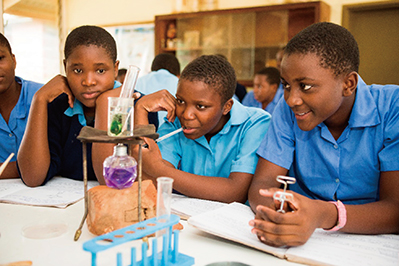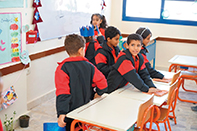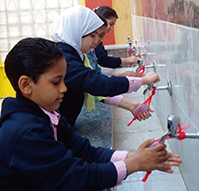(3) Quality Education for All
Education plays an important role in the socio-economic development that is needed for poverty reduction. At the same time, it also enables individuals to develop their potential and capability, as well as to live with dignity. Also, by fostering understanding of other people and different cultures, education forms the foundation for peace. Moreover, through education, it is possible to acquire the knowledge needed for economic and social development, which will in turn reduce poverty. However, there are still approximately 64 million children worldwide, who cannot go to elementary school. In particular, in countries and regions affected by conflict, the proportion of out-of-school children that was 29% in 2000 had increased to 35% (approximately 21.5 million children) in 2014, making this a serious issue.
In order to improve this situation, Goal 4 of the SDGs has been set up as “Ensure inclusive and equitable quality education and promote lifelong learning opportunities for all.” The international community formulated the “Education 2030 Framework for Action”* in 2015, with the aim of achieving Goal 4 of the SDGs.
■Japan’s Efforts
Valuing “nation-building” and “human resources development,” Japan has been providing developing countries with a broad range of support for education, including the enhancement of basic education*, higher education, and vocational training. Coinciding with the UN Summit for the adoption of the 2030 Agenda for Sustainable Development in 2015, Japan announced a new education cooperation strategy entitled “Learning Strategy for Peace and Growth.” This strategy was formulated to serve as a thematic policy in the field of education under the Development Cooperation Charter (approved by the Cabinet in 2015), and was drawn up based on the exchange of a wide range of views with experts in development education, NGOs that support education, relevant international organizations, and other parties. This strategy aims to achieve quality education through mutual learning, under the following basic principles: (i) education cooperation to achieve inclusive and equitable quality learning, (ii) education cooperation for industrial, science and technology human resources development and building the foundation of socio-economic development, and (iii) establishment and expansion of global and regional networks for education cooperation.
At the UN High-level Political Forum held in July 2017, then Foreign Minister Kishida focused on children and youth and expressed Japan’s intention to provide $1 billion in support until 2018, primarily in the fields such as education, health, disaster risk reduction, and gender. Japan is steadily implementing assistance, which include securing educational opportunities for children placed in vulnerable situations, vocational training, improving the human rights situation for women and children, and countermeasures against infectious diseases and improvement of sanitation for children.

Students from Malawi conducting an experiment on photosynthesis and chloroplast under the “Project for Strengthening of Mathematics and Science in Secondary Education in Malawi.” (Photo: Shinichi Kuno/JICA)
Also, with regard to the Global Partnership for Education (GPE)*, which lays out the international framework for achieving universal primary education, Japan has contributed a total of approximately $26.53 million to the GPE Fund from FY2008 to FY2018. In partner countries that received support through GPE, more than 77 million children became capable of receiving primary education in 2016 compared to 2002. In December 2018, Japan, in cooperation with other donors including the Asian Development Bank (ADB), World Bank, and UNICEF, signed an Exchange of Notes on the “Fourth Primary Education Development Programme,” a grant aid that provides financial support for implementing primary education policies in Bangladesh, with the aim of improving the quality of primary education in the country.
With regard to initiatives for Africa, at TICAD VI held in 2016, Japan announced that it would train approximately 20,000 science and mathematics teachers over the course of three years starting in 2016, contributing to strengthening basic academic skills in science and technology. Moreover, in Niger and other West African countries, Japan is implementing the “School for All” project, which aims to build relationships of trust between schools, parents and guardians, and local residents, as well as improve the education environment for children. In addition, in order to contribute to the development of education and improvement of its quality in the Asia-Pacific region, Japan is providing support for organizing the convention of the Asia-Pacific Meeting on Education 2030 (APMED2030), a forum for discussing progress in the achievement of Goal 4 of the SDGs, as well as for initiatives toward the achievement of Goal 4 in the same region, through the establishment of a trust fund within the United Nations Educational, Scientific and Cultural Organization (UNESCO). Furthermore, Japan supports human resources development in developing countries by engaging in efforts to strengthen networking among higher education institutions between Japan and ASEAN, collaborating with the industrial sector, participating in joint research projects with neighboring countries, accepting international students to Japanese institutions of higher education and other institutions in accordance with the “300,000 International Students Plan,” and a wide range of other measures.
●Egypt
Egypt-Japan Education Partnership (EJEP) “Introduction of Japanese-style Education in Egypt”
Technical Cooperation Project (February 2017 – (ongoing)), / ODA Loan (2018 – (ongoing))
Currently in Egypt, support for the education sector by Japan is receiving substantial attention.

Cleaning activity in a newly-opened “Egypt-Japan School”

“Hand-washing activity” in a pilot school
“Education is water and air.” This is a traditional expression in Egypt conveying the importance of education. In any country in the world, a national education is an important issue, which influences the country’s development. During Prime Minister Abe’s visit to Egypt in 2015, President el-Sisi expressed his interest in “introducing Japanese-style education,” and as part of the “Egypt-Japan Education Partnership (EJEP)” agreed in 2016, steady progress has been made under the strong leadership of the President.
In Egypt, it used to be difficult to say that the quality of school education was adequately maintained. Under such circumstances, since in February 2017, as an effort to “introduce Japanese-style education,” Japan has been introducing Japanese school activities, such as cleaning activities at school, day duties, and class meetings, into local schools. These activities are called “tokkatsu” (short for “tokubetsu katsudo” or “special activities” in Japanese), which any Japanese people are familiar with. School children are expected to cultivate a sense of teamwork, responsibility and consideration for others through these activities.
Following trial activities in pilot schools which started in 2017, as many as 35 new schools opened in September 2018 as “Egypt-Japan Schools,” wherein the Japanese-style education was introduced. We have heard feedback from children’s parents saying that, “My child now proactively helps out,” and teachers have also mentioned that, “My communication approach to school children has changed. Now I listen to their opinions more.”
Going forward, “Tokkatsu” efforts are expected to be rolled out further, to other schools in Egypt, but the development of human resources is not something that can advance in a brief period of time. Japan will continue to provide long-term support, to establish Japanese-style education, in the appropriate way for educational circumstances in Egypt.
●Promoting Education for Sustainable Development (ESD)
After the “UNESCO World Conference on Education for Sustainable Development (ESD)”* held in Japan in 2014, activities related to ESD have been carried out worldwide under the “Global Action Programme (GAP) on ESD,” adopted as the successor program to the “UN Decade of ESD (UNDESD)” program. As the GAP, a program promoting global action, comes to a close in 2019, UNESCO, at Japan’s proposal, began to work on the draft for a successor framework for GAP, and submitted the draft to the UNESCO Executive Board in the spring of 2019. Japan also supports the implementation of GAP through financial contribution to a trust fund at UNESCO, and is actively promoting ESD by establishing the “UNESCO-Japan Prize on ESD,” which has been presented to 12 organizations to date. Currently, international discussions are ongoing about the successor framework for GAP with the aim of further promoting ESD.
- *Education 2030 Framework for Action
- The Education 2030 Framework for Action succeeds the EFA Dakar Framework for Action aimed at achieving education for all, adopted at the World Education Forum in Dakar, Senegal in 2000. It was adopted at the Education 2030 High-Level Meeting, which was held to coincide with the UNESCO General Conference in 2015.
- *Basic education
- Basic education is the educational activities designed to enable individuals to acquire the knowledge, values, and skills necessary to live. It mainly refers to primary education, lower secondary education (equivalent to Japanese junior high school), pre-school education, and adult literacy education.
- *Global Partnership for Education (GPE)
- GPE refers to an international partnership established under the leadership of the World Bank in 2002, which supports the education sector in developing countries. Its members include developing countries, donor countries and organizations, civil society, and private-sector corporations and foundations. It was renamed as GPE from Fast Track Initiative (FTI) in 2011.
- *Education for Sustainable Development (ESD)
- ESD refers to education that fosters leaders responsible for the creation of sustainable societies. “Sustainable development” means development that “meets the needs of the future generations while also meeting the needs of the present generation.” In order to build such society, it is necessary to perceive a variety of challenges in contemporary society such as environment, poverty, human rights, peace, and development as one’s own problems, and to then work to find solutions for them. For that purpose, ESD puts importance on creating new values and actions.
